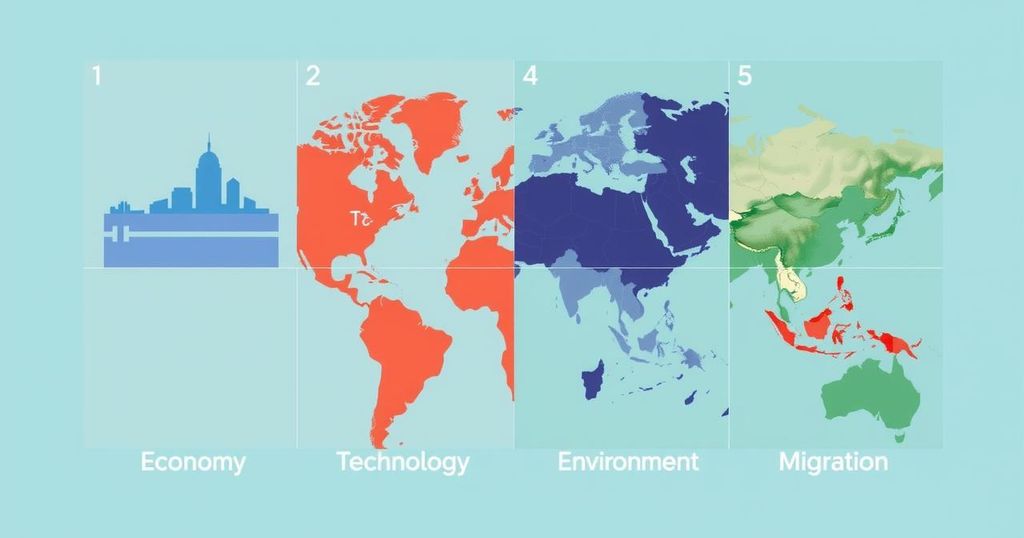The outlook for 2025 reveals persistent concerns over inflation, AI-driven job losses, climate change, and immigration, yet a cautious optimism is emerging. A recent survey indicates that 71% of respondents believe the upcoming year will be better. Economic instability and societal anxieties shape perceptions, with significant implications for future policies.
As we approach 2025, several pressing global concerns remain at the forefront, including inflation, job losses driven by advancements in artificial intelligence, climate change, and rising immigration. Despite these challenges, a degree of optimism is emerging among populations worldwide. A recent survey of 23,721 adults across 33 nations revealed that 71% of participants anticipate the forthcoming year will be better than the previous one—a slight increase from 2024. Central themes influencing these perceptions include economic stability, societal anxieties, and technological progress.
The survey, conducted between October 25 and November 8, indicates a cautious shift in sentiment. While the cost-of-living crisis and geopolitical disputes persist, there is a notable decline in the number of individuals viewing 2024 as particularly unfavorable; 51% rated it a bad year for their families, down from 53% in 2023, and 65% did likewise for their countries, a drop from 70%. This reflects a gradual easing of negativity, suggesting a resilient outlook and cautious optimism for the future.
Concerning economic conditions for 2025, inflation is a key worry, with 79% of respondents fearing that prices will rise faster than incomes. This reflects ongoing economic pressures since 2022. Furthermore, 74% expect tax increases, underscoring concerns about financial burdens. Conversely, expectations regarding rising interest rates are decreasing, hinting at a belief that central banks may soon ease their monetary tightening.
In the United States, Latino communities particularly resonate with broader economic worries about cost hikes and job security. While 65% remain anxious about job displacement due to AI, 43% recognize opportunities arising from such technological advancements, indicating a complex perspective on the impact of technology. In Latin America, there is a similar sentiment, with inflation and unemployment leading public concerns as countries like Brazil, Mexico, and Argentina continue to face significant economic challenges.
On the topic of immigration, the survey revealed that 67% of participants expect an increase in immigration to their countries in 2025, marking a slight decline from previous years. Countries such as Turkey and Spain show heightened expectations (84% and 80%, respectively), compared to more moderate views from the U.S. (56%) and Canada (55%). Ipsos emphasizes that public perception regarding immigration is often influenced more by societal anxieties and political narratives than by actual migration statistics.
Technological progress presents a dual challenge. Anticipations of job losses due to AI coexist with hopes for innovations in sectors such as healthcare; 40% of respondents believe significant medical breakthroughs, including potential cures for diseases like cancer, could be achieved. Meanwhile, fears surrounding climate change remain evident. Eighty percent of respondents foresee rising global temperatures, and 72% expect more extreme weather events. However, beliefs that governments will implement stricter measures against climate change are waning, with expectations for more stringent carbon emission policies dropping to 52% this year.
In summary, while a variety of significant challenges persist as we approach 2025, including inflation, technological advancements, climate change, and immigration, there is a discernible upward shift in global public sentiment. Although individuals remain wary of economic and societal factors, many express a tempered optimism, indicating resilience and hope for a better future.
The topics of inflation, artificial intelligence, climate change, and immigration are fundamentally interconnected and affect various socio-economic landscapes globally. These themes were analyzed through a comprehensive survey targeting diverse populations in 33 countries, revealing insights into public sentiment and outlooks as they relate to challenges and expectations for 2025. This reflects broader economic conditions, societal anxieties, and evolving perceptions of technological advancements and their implications on the labor market and environmental policies.
As 2025 looms closer, global citizens are grappling with significant issues such as inflation, potential job displacement from AI, climate change, and immigration trends. Despite persistent concerns, a measured optimism is emerging, suggesting that people are finding resilience amid these challenges. The survey indicates a delicate balance between apprehensions about economic pressures and hopes for technological advancements that may offer new opportunities. The need for effective and timely policy responses remains critical to addressing these pressing global concerns.
Original Source: www.latintimes.com






